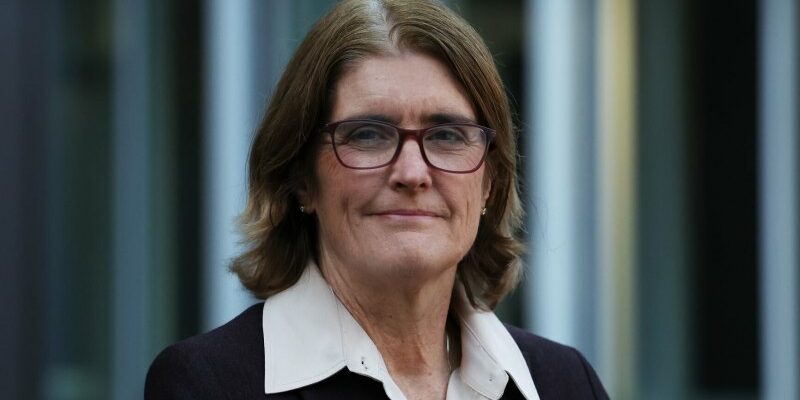Save articles for later
Add articles to your saved list and come back to them any time.
Home buyers’ reprieve from rising interest rates continues, with the Reserve Bank keeping the official cash rate steady for the fourth month in a row amid more signs the economy is slowing.
New governor Michele Bullock and the bank board on Tuesday left rates at 4.1 per cent to allow more time to assess the effect of previous rate rises, although they warned further increases may still be necessary to get inflation down.
Michele Bullock helmed her first Reserve Bank board meeting on Tuesday.Credit: Bloomberg
The RBA’s aggressive tightening of monetary policy over the past 17 months has pushed up monthly repayments on an average $600,000 mortgage by more than $1350.
In her first board statement as governor, Bullock said the bank’s 4 percentage points of rate rises since May last year were working to establish a better balance between supply and demand, but inflation would remain above target for some time.
“Inflation in Australia has passed its peak but is still too high and will remain so for some time yet,” she said.
“Timely indicators on inflation suggest that goods price inflation has eased further, but the prices of many services are continuing to rise briskly and fuel prices have risen noticeably of late. Rent inflation also remains elevated.”
At the monthly level, inflation in Australia pushed up to 5.2 per cent in August, largely because of a jump in oil prices.
Bullock echoed her predecessor Philip Lowe’s comments about the dangers of inflation remaining too high for too long.
“High inflation … erodes the value of savings, hurts household budgets, makes it harder for businesses to plan and invest, and worsens income inequality,” she said.
“And if high inflation were to become entrenched in people’s expectations, it would be very costly to reduce later, involving even higher interest rates and a larger rise in unemployment.”
Bullock warned there were still uncertainties ahead for the economy, including the delayed effect of previous rate rises, and the global impact of China’s economic woes.
“Some further tightening of monetary policy may be required to ensure that inflation returns to target in a reasonable timeframe, but that will continue to depend upon the data and the evolving assessment of risk,” she said.
“The board remains resolute in its determination to return inflation to target and will do what is necessary to achieve that outcome.”
The bank’s decision to leave rates on hold was widely expected as economic data suggests the bank’s efforts to reduce inflation by slowing the economy are working.
Australian Bureau of Statistics figures last week showed households spent less in August than in November last year, while separate data showed job vacancies in the three months to August dropped 8.9 per cent – one of the largest quarterly falls in vacancies this century.
Figures released by the bureau on Tuesday suggest the surge in rents is bringing investors back into the property market.
The value of loans to investors increased by 1.6 per cent in August to $8.8 billion. Since the start of the year, investor loans have climbed by more than 13 per cent. Loans to owner-occupiers over the same period have improved by a more modest 7 per cent.
The bureau’s head of finance statistics, Mish Tan, said the number of new loans to owner-occupiers had returned to pre-COVID levels.
But she noted there continued to be strong evidence of people re-financing their loans in response to the rapid increase in mortgage interest rates.
“Since November 2022, the number of refinanced loans has been above the number of new owner‑occupier loan commitments. Refinancing has remained at unprecedented levels as households continued to seek better loans amid a high interest environment,” she said.
Separate data from the bureau showed there was a 7 per cent lift in dwelling approvals in August, led by sharp increases in Victoria (up 22.2 per cent), NSW (up 12.5 per cent) and Western Australia (up 12.3 per cent).
There was a sharp spike in approvals for units in Victoria and NSW, adding to evidence the tight rental market is bringing more projects onto the market.
Cut through the noise of federal politics with news, views and expert analysis. Subscribers can sign up to our weekly Inside Politics newsletter.
Most Viewed in Politics
From our partners
Source: Read Full Article

